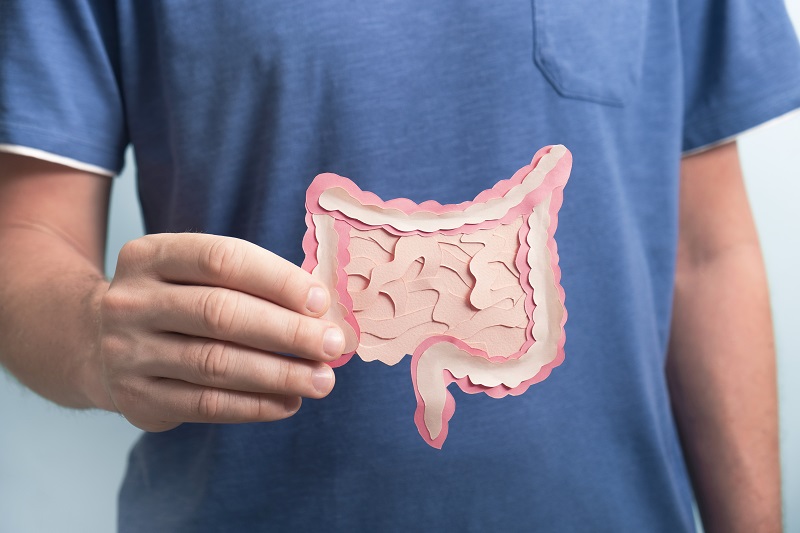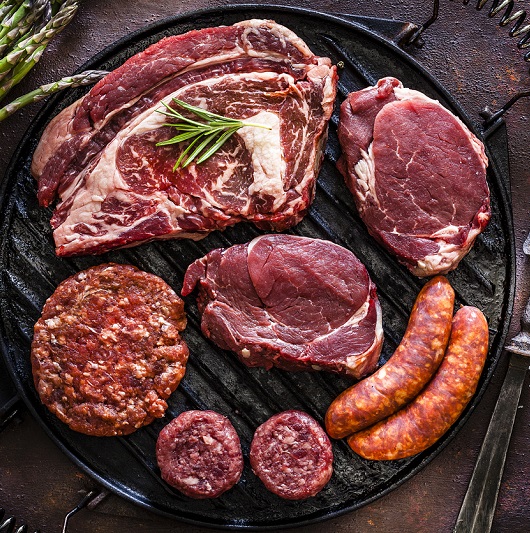

Updated on April 15, 2025
Colorectal cancer is the fourth most common cancer in the U.S. While overall rates of the disease have been falling for decades, rates are climbing in people under 55.
As more young people develop this cancer, questions about it are at an all-time high. What causes it? How does it progress? And how can we treat it.
Growing research has shown that our gut microbiome may play a role in colorectal cancer risk. Read on to learn what we know so far.
What Is the Gut Microbiome?
“In simple terms, the gut microbiome is the billions of microorganisms that live in our intestines,” says John Theurer Cancer Center registered oncology dietitian Sarah Arnao. “The majority of these bacteria live in our colon, but some can be found in our small intestine.”
These tiny bacteria have many important jobs, including:
- Strengthening the gut barrier
- Protecting us from harmful bacteria and viruses
- Creating vitamins and hormones
- Impacting the fats in our blood that affect our heart health
How the Gut Microbiome Impacts Colon Cancer
“What we eat and our environment can cause changes in the gut microbiome,” says Sarah. “Research now shows that an imbalance in our gut microbiome can cause inflammation and may contribute to the development of colorectal cancer.”
Despite more research being needed to confirm a causal relationship, Sarah states there is no harm in being proactive to promote a healthy gut and making changes in your diet now.
Sarah recommends following three guidelines:
1. Eat foods with probiotics.
Fermented foods, like yogurt and kefir, contain microorganisms called probiotics. These living microorganisms, sometimes called “good bacteria,” support the microbiome in our digestive tract.
Eating probiotics can help maintain balance in the microbiome. Look for foods whose labels say "live and active cultures." Some examples include:
- Fermented soy (miso, tempeh, tamari and natto)
- Fermented condiments (some relishes and pickled ginger)
- Fermented beverages (kombucha)
- Fermented fruits (chutneys and pickled jackfruit)
- Fermented vegetables (sauerkraut, kimchi and pickled cucumber, beets or carrots)
2. Eat a fiber-rich diet filled with prebiotics.
Eating a diet high in fiber can reduce the risk of colon cancer. To increase your fiber intake, fill half of your plate with fruits and vegetables and one-quarter with whole grains.
Prebiotics are fiber-rich foods with nutrients probiotics need to flourish. When probiotic bacteria break down prebiotics in the colon, they produce butyric acid. This acid fuels our digestive cells and protects the digestive tract from harmful bacteria.
Some prebiotic foods include:
- Onions
- Garlic
- Chicory root
- Bananas
- Artichokes
- Soybeans
- Some cereals, breads and yogurt with added fiber
3. Eat a plant-forward diet.
Plants reduce inflammation and help you maintain a healthy weight. Both of these benefits lower your risk of colorectal cancer.
Eating enough calcium from things like milk, cheese and leafy greens can also help protect you from colon cancer.
Aim for a balanced diet, including:
- 1.5 to 2 cups of whole fruits per day
- 2 to 3 cups of vegetables per day
- Beans, legumes, nuts and seeds
- Whole grains
- Fish, seafood, poultry, eggs and low-fat dairy in moderation throughout the week
- Red meat, processed meats and sweets in small portions only once or twice a month
“It’s important to avoid processed meats, like hot dogs, sausage or deli meats – processed meats and processed poultry are preserved by smoking, salting curing or by the addition of preservatives, all of which can increase your risk,” adds Sarah.
“Colorectal cancer is one of the most preventable cancers; it can be prevented through lifestyle and diet modifications,” Sarah notes. “Don’t forget to stay active, at least 150 minutes a week and to limit alcohol if you consume it at all.”
Diet & Screening: A Prevention Pair
Taking care of your gut is a good way to protect yourself from colorectal cancer. But just as important is timely screening.
Catching cancer early or before it begins leads to the best outcomes. The age to start screening for colorectal cancer is 45. If you’re due—or overdue—for a stool test or colonoscopy, talk to your doctor about scheduling your test.
Next Steps & Resources:
- Make an appointment with a gastroenterologist near you, or call 800-822-8905.
- Learn more about the foods that can help reduce cancer risk.
- Learn more about gastroenterology at Hackensack Meridian Health.
Find a doctor near me

What Does Colon Cancer Feel Like?

Are Colon Cleanses Safe?

Colon Cancer: Will Eating Meat Increase My Risk?
